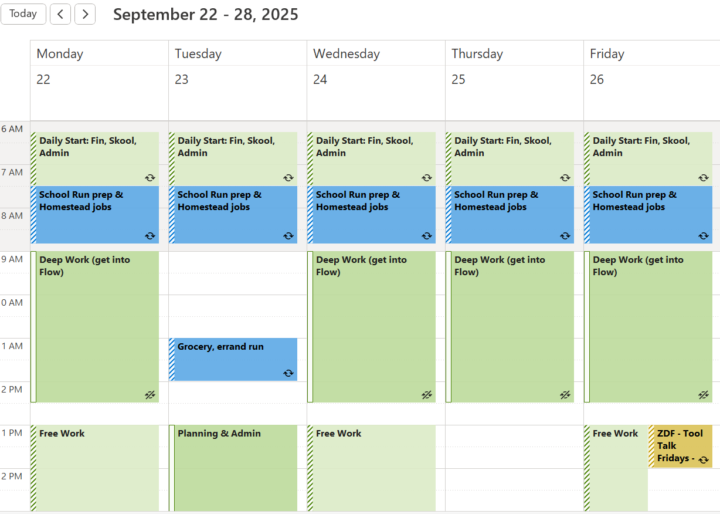Activity
Mon
Wed
Fri
Sun
Oct
Nov
Dec
Jan
Feb
Mar
Apr
May
Jun
Jul
Aug
Sep
What is this?
Less
More
Memberships
CortexTools
443 members • $47/m
Mitt Media Group (Free)
1k members • Free
School of Mentors
6.8k members • $49/m
DH
Digital Hustler🚀
7 members • Free
2 contributions to ReadyOpsGo by Lena Gallagher
Office Hours are starting on Oct 20th!
On Monday, October 20 at 11am EST (i.e. Toronto time...because I'm terrible with time zones!) I’ll be running the first bi-weekly Office Hours call inside ReadyOpsGo (via Skool Live). These sessions are your chance to: - Bring whatever’s tripping you up in your business operations - Ask questions - Brainstorm next steps together with the group No slides. No fluff. Just real talk and problem-solving. See you then & there...bright eyed & bushy tailed!
How do you all appraoch the week in terms of planning for it?
There are a dime a dozen ways to plan and manage your week. I’m curious to learn yours 👀 Here’s what I do: 1. I use several Outlook calendars that overlay each other: 2. At the start of the month, I set up my weekly template (image attached). I drop in non-negotiables first (school runs, workouts 💪) and then add blocks for deep work, admin, and free-choice work. 3. Before each week begins, I replace template blocks with specific tasks. For example, a “Deep Work” block becomes “VJ project work.” 4. My main calendar is the work one, so everything goes in there (including personal) to avoid double-booking. 5. For in-person appointments, I add buffer time before and after (I call it b/out 🚗). I'll also add in prep time if needed for virtual appointments. 6. The personal calendar is really just for my kids’ activities. If it only needs me to remind them, it stays on personal. If I have to pick them up, it also goes on my work calendar. 7. Everything is color-coded (same colors and categories across all calendars) so I instantly know what type of appointment it is. 8. I adjust daily as things change. So bascially, the flow looks like this: - Monthly: plan the big picture - Weekly: pre-plan details - Daily: adjust as needed And repeat... Things I DON'T DO: - Duplicate recurring commitments in both calendars (too cluttered). - Beat myself up if it doesn’t go to plan. Life happens 🤷♀️ - Waste time making my calendars “pretty” or "perfect". These are tools that need to be functional, practical, and easy to maintain. Real-talk: if you need 'pretty', then have at it, but don't fool yourself thinking you're doing actual IPA (income producing activity). Now that I’ve shown you mine 😉… your turn! What tool, routine, or proecess do you use to plan your week?

4 likes • 19d
I like your system a lot 👌 The color-coding and buffer time idea is really smart (I often forget to plan extra time for travel 🚗). I use something a bit different, more like FranklinCovey. I start with my roles and goals for the week, then I block the most important tasks first. But I can see how your calendar overlays give a clear picture of everything in one place. Might try that 🙂 Do you usually do a full Sunday reset to plan the week, or do you adjust more day by day? ——-Here’s what I do with the FranklinCovey method (although I don’t use it regularly:/) 1. Think about roles – At the start of the week, I look at my main roles (for example: son, worker, friend, brother). For each role, I choose 1–2 important goals for the week. 2. Weekly Compass – I write these goals in the “compass” page. This helps me connect my week with my values and long-term plans. 3. Plan the week – I put the most important tasks (“big rocks”) into my calendar first. Example: if one goal is “finish client proposal,” I block time on Tuesday morning. 4. Daily tasks – Each day I make a list of tasks and meetings. I mark them A, B, or C (A = most important, B = should do, C = nice if I have time). 5. Move tasks carefully – If I don’t finish something, I ask: is it really important? If yes, I move it to another day. If not, I let it go. 6. Review and reflect – At the end of the week, I check what worked well and what I can improve for next week. The flow looks like this: - Weekly: choose roles and goals → plan important tasks. - Daily: do the tasks by priority. - End of week: review and prepare for next week. Things I don’t do: - I don’t start with small tasks. I start with roles and goals. - I don’t make my list too long. I focus on the most important things. PS 1: my roles and goals are informed by my values
1-2 of 2
@michael-heckmeier-9974
Building from scratch with AI, and automation. I share openly what I learn so others can succeed too. My drive: giving my Mama the best future.
Active 10m ago
Joined Sep 8, 2025
INFP
Powered by


